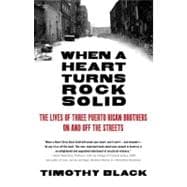
Note: Supplemental materials are not guaranteed with Rental or Used book purchases.
Purchase Benefits
Looking to rent a book? Rent When a Heart Turns Rock Solid The Lives of Three Puerto Rican Brothers On and Off the Streets [ISBN: 9780307454874] for the semester, quarter, and short term or search our site for other textbooks by Black, Timothy. Renting a textbook can save you up to 90% from the cost of buying.
| Introduction | p. ix |
| List of People in the Book | p. xxxvii |
| Social Marginalization | |
| "I Am a Jibaro, but I Get My Hair Cut in the City" | p. 3 |
| The Lost Generation | p. 24 |
| Bilingual Education and the School Dropout | p. 51 |
| The Tail of the Drug Trade | p. 70 |
| Jobs | |
| The Block | p. 107 |
| Leaving the Streets | p. 137 |
| Transitions | p. 169 |
| Living Through the Urban Drug War | |
| The Prison Pipeline | p. 209 |
| Rebel Without a Cause | p. 230 |
| When a Heart Turns Rock Solid | p. 267 |
| Good and Bad | p. 298 |
| Conclusion | p. 336 |
| Acknowledgments | p. 351 |
| Notes | p. 353 |
| Index | p. 399 |
| Table of Contents provided by Ingram. All Rights Reserved. |
The New copy of this book will include any supplemental materials advertised. Please check the title of the book to determine if it should include any access cards, study guides, lab manuals, CDs, etc.
The Used, Rental and eBook copies of this book are not guaranteed to include any supplemental materials. Typically, only the book itself is included. This is true even if the title states it includes any access cards, study guides, lab manuals, CDs, etc.
Excerpted from When a Heart Turns Rock Solid: The Lives of Three Puerto Rican Brothers on and off the Streets by Timothy Black
All rights reserved by the original copyright owners. Excerpts are provided for display purposes only and may not be reproduced, reprinted or distributed without the written permission of the publisher.